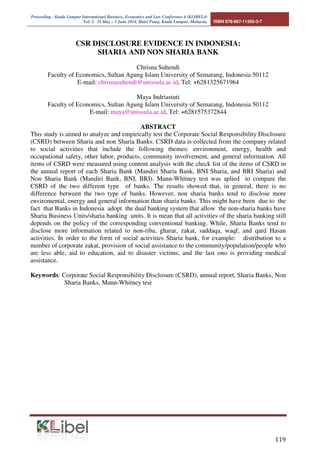This summary analyzes the differences in corporate social responsibility disclosure (CSRD) between Sharia and non-Sharia banks in Indonesia. The study analyzed CSRD data from the annual reports of 3 state-owned non-Sharia banks (Bank Mandiri, BNI, BRI) and their corresponding Sharia banks (Bank Mandiri Sharia, BNI Sharia, BRI Sharia). Mann-Whitney tests found no significant overall difference in CSRD between the two bank types. However, non-Sharia banks tended to disclose more information on the environment, energy, and general information while Sharia banks disclosed more on Sharia-compliant financing activities. Both bank types disclosed similar information on other labor,




![Proceeding - Kuala Lumpur International Business, Economics and Law Conference 4 (KLIBEL4)
Vol. 2. 31 May – 1 June 2014. Hotel Putra, Kuala Lumpur, Malaysia. ISBN 978-967-11350-3-7
BNI Sharia 3.0 0.0 0.0 16.0 4.0 8.0 3.0 34.0
BRI Sharia 3.0 0.0 0.0 7.0 5.0 6.0 3.0 24.0
Average 3.0 0.0 2.0 12.7 5.3 7.3 2.7 33.0
Source: were collected and calculated by the author from the annual reports issued by the banks
Table 4: CSRD Index between Non-Sharia and Sharia Banks, 2012
Non Sharia
Env.
(7)
Energy
(3)
L.H.S
(8)
O.E.
(28)
Prod.
(6)
C.I (9)
General
(2)
Total
(63)
Mandiri 0.86 1.00 0.13 0.54 1.00 1.00 0.50 5.02
BNI 0 .57 0.33 0.13 0.71 1.00 0.89 0.50 4.13
BRI 0 .86 1.33 0.88 0.64 1.00 0.89 0.50 6.10
Average 0.76 0.89 0.38 0.63 1.00 0.93 0.50 5.08
Sharia
BSM Sharia 0.4 0.0 0.6 0.5 1.0 0.8 1.0 4.4
BNI Sharia 0.4 0.0 0.0 0.6 0.9 0.9 1.0 3.7
BRI Sharia 0.4 0.0 0.0 0.2 0.6 0.6 1.0 2.8
Average 0.4 0.0 0.2 0.4 0.8 0.8 1.0 3.6
Source : Data Processed, 2014
Table 5: Mann-Whitney Test
Test Statisticsb
TI
Mann-Whitney U 1.000
Wilcoxon W 7.000
Z -1.528
Asymp. Sig. (2-tailed) .127
Exact Sig. [2*(1-tailed Sig.)]
.200a
a. Not corrected for ties.
b. Grouping Variable: Kelompok
Tabel 6: Mann-Whitney Test - Item of CSRD
Test Statisticsb
Env. Energy L.H.S O.E. Prod. C.I. General
Mann-Whitney U .000 .000 2.000 4.000 1.500 2.000 .000
Wilcoxon W 6.000 6.000 8.000 10.000 7.500 8.000 6.000
Z -2.023 -2.087 -1.124 -.218 -1.549 -1.107 -2.236
Asymp. Sig. (2-tailed) .043 .037 .261 .827 .121 .268 .025](https://image.slidesharecdn.com/kle4215-chrisna-141113220836-conversion-gate01/85/KLE4215-5-320.jpg)
![Proceeding - Kuala Lumpur International Business, Economics and Law Conference 4 (KLIBEL4)
Vol. 2. 31 May – 1 June 2014. Hotel Putra, Kuala Lumpur, Malaysia. ISBN 978-967-11350-3-7
Exact Sig. [2*(1-tailed
Sig.)]
.100a .100a .400a 1.000a .200a .400a .100a
a. Not corrected for ties.
b. Grouping Variable: Group
DISCUSSION.
Generally, CSRD of non-sharia banks is not significantly different from the sharia ones.
However, when it is viewed from an individual item, it can be seen that environment, energy and
general information of the conventional banks was shown to be higher than sharia banking. This
might have been due to the fact that banks in Indonesia adopt the dual banking system that
allow the non-sharia banks have Sharia Business Units/ sharia banking units. It is mean that all
activities of the sharia banking still depends on the policy of the corresponding conventional
banking. In addition, the main income sources of Sharia CSR came from the charity fund (qardhul
hasan) which derived from non-kosher and can also come from fines for late return of the
obligations by the customers, it should not be categorized in the operating income of the bank. The
loans virtue is granted to the poor and aimed to encourage their bussiness for their survival. In
addition, social fund collected by the three banks were obtained from corporate zakat, employee
zakat, as well as customers bank donation.
CONCLUSION.
There was no significat difference in CSR disclosure between sharia banks and non-sharia banks.
This study has a limitation, that is there is no CSRD standard on the sharia bank. Sharia banks
should be able to make corrective of measurement in the CSR disclosure. Last but not least, the
study period needs to be extended so that CSRD is getting better.
REFERENCES
Ahzar, Fahmi Ali dan Trisnawati, Rina. (2013). Pengungkapan Islamic Social Reporting Pada
Bank Syariah di Indonesia. Proceeding Seminar Nasional dan Call for Papers SanCall.
Surakarta. 23 Maret 2013. ISBN. 978-979-636-147-2.
Anto dan Astuti. (2008). Persepsi Stakeholder terhadap Pelaksaan Corporate Social responsibility
: Kasus pada Bank Syariah di DIY. Jurnal Kajian Bisnis dan Manajemen. Yogyakarta :
Sinergi
Bank Indonesia. (2010). Statistik Perbankan Syariah Januari 2010. Direktorat Perbankan Syariah
Bank Indonesia. Jakarta
____________. (2008). UU No. 21 tahun 2008 . Tentang Perbankan Syariah. Jakarta
Bank Mandiri. (2012). Laporan Tahunan
Bank Syari’ah Mandiri. (2012). Laporan Tahunan
Bank BNI. (2012). Laporan Tahunan
Bank BNI Syari’ah. (2012). Laporan Tahunan
Bank BRI. (2012). Laporan Tahunan](https://image.slidesharecdn.com/kle4215-chrisna-141113220836-conversion-gate01/85/KLE4215-6-320.jpg)

